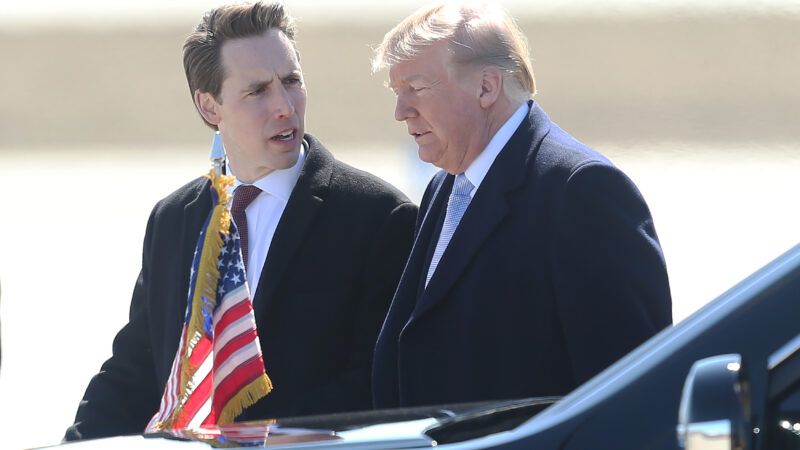Trump's Tariffs Made D.C. Swampier as Senators, Lobbyists Sought Special Favors for Connected Companies
Sen. Josh Hawley, a supporter of Trump's trade policies, lobbied to give a special exemption to a Missouri-based power tools manufacturer. Many other elected officials did too.

When a Missouri-based power tool manufacturer was facing the prospect of higher costs due to new tariffs on imported saw blades, it turned to friends in high places for help—including Sen. Josh Hawley (R–Mo.).
Hawley has been an outspoken supporter of President Donald Trump's destructive trade policies. In fact, he's suggested that the president should have done more to dismantle the system of global trade. But Hawley was one of four members of Missouri's congressional delegation to sign onto a letter sent in September 2019 asking the U.S. trade representative to grant a special exemption for SM Products, which is based in Kansas City.
"It would not be beneficial to impair a small American company that does not have the financial resources or alternative supply chain options," the lawmakers wrote in the letter, which was obtained and published this week by the Wall Street Journal. Because SM Products had contracts locked-in months in advance, it had no choice but to eat the cost of the tariffs, they wrote, warning that "this cost will likely prevent SM Products from reaching profitability, thereby jeopardizing its future viability."
In short: China wasn't paying for the tariffs.
The tariff costs facing SM Products were also hitting many other American manufacturers since much of American manufacturing is dependent on the ability to import low-cost inputs from China and elsewhere. But while some companies were able to find members of Congress willing to lobby on their behalf before the unelected board of trade officials who get to decide which tariff exemptions to grant and which requests to ignore, most other American businesses were less fortunate.
As I reported in May 2018 when the Trump administration was first considering imposing tariffs on thousands of Chinese-made products, the U.S. International Trade Commission hearing was a five-day parade of business owners literally begging the federal government not to do it. One after another, for five minutes at a time, hundreds of business owners told the commission much the same thing that Hawley and his colleagues wrote in that letter: Tariffs would hurt their profitability. Contracts were already locked in and couldn't be altered at the drop of a hat. Alternative supply chains would take time and money to develop.
Once the tariffs were in place, the Trump administration set up a murky, confusing process for companies to request exemptions. It was, and is, a system that almost seems designed to be exploited by politically connected firms and individuals. Indeed, right from the start of the Trump trade wars, some major American steel manufacturers appeared to be exercising undue influence over the exemption process. Members of Congress have warned that the process lacks "basic due process and procedural fairness" and that it could be "abused for anticompetitive purposes." After two years, the government's own data suggest that's exactly what has happened.
Hawley's letter was hardly the only one. The Journal says it obtained more than 100 letters from members of Congress to the U.S. trade representative seeking special treatment for connected companies. "Some of these exclusions were granted, and many weren't. It's difficult to know if lobbying by Congress made a difference since the Trump Administration's approval process is a black box," the paper reports.
Under those circumstances, then, it should be no surprise that businesses that could afford to do so started hiring lobbyists to navigate the new tariff regime. The amount of money spent on lobbying work related to tariffs increased 900 percent as the trade war was getting started.
If you had the connections necessary to get a couple of members of Congress to write a letter to the U.S. trade representative on your behalf, as the owners of SM Products apparently did, you'd be foolish not to try that too. Most businesses, however, can't afford to hire lobbyists and don't have easy access to a sitting senator. They just have to pay the tariff bill.
These are all unintended but completely expected consequences of Trump's trade war and his poorly thought-through plan to use higher tariffs as a cudgel against China. Not only did Trump's trade policies run directly counter to his promises to "drain the swamp" by creating opaque bureaucracies that can decide the fates of small businesses all over the country, but they actually created incentives for the swamp to get even swampier.
In the warped reality the trade war helped to create, a company in Kansas City might not succeed or fail based on the quality of the power tools it is manufacturing, but on whether its owners know the right men in Washington.
As soon as he takes the oath of office, President-elect Joe Biden ought to scrap every last part of Trump's tariffs. Unfortunately, that doesn't seem likely. Maybe Republicans will finally start to care about undoing the bureaucracy of tariff exemptions once Democrats are running it.


Show Comments (85)